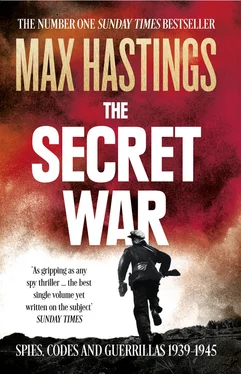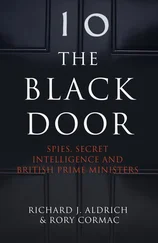1 ...8 9 10 12 13 14 ...47 The Soviet Union owned the most active and best-resourced intelligence organisations in the world – the Red Army’s GRU and the NKVD, the latter controlled by Beria from December 1938. The foremost purposes of Joseph Stalin, master of the Kremlin, were the promotion of socialism abroad through the Comintern and the maintenance of his own power against domestic and foreign enemies. Both required spies in profusion. Throughout the 1930s, Russia pursued a strategy more far-reaching in its means – the plantation of deep-penetration agents – and its ends – the worldwide triumph of communism – than those of any other nation. How far the funds and energy lavished on its secret war profited the Soviet Union will be considered below. Here, it suffices to say that the espionage networks it established in the US, Britain, Japan and Europe were on a scale far beyond those of any other nation, and manifested in big things and small. When Japanese police arrested a Soviet agent carrying a Leica camera, Tokyo’s intelligence officers were pathetically envious: they could not afford to equip their own spies with technology remotely so sophisticated. This was a time when tens of millions of Russians were starving, yet Stalin’s agents spent whatever seemed necessary to purchase information and the deaths of enemies. From Switzerland to Mexico they left roadsides studded with corpses, and created some of the most remarkable agent networks in the history of intelligence.
The Russian addiction to espionage and conspiracy was as old as time. In 1912, when according to official figures Germany spent £80,387 on its secret service, France £40,000 and Britain £50,000, the Russians avowed a budget of £380,000, plus a further £335,000 for the tsar’s secret police. Tsarist codebreakers achieved some notable coups, and their successors sustained the tradition. In the 1930s the NKVD’s Fourth Department, the world’s most lavishly-funded signals intelligence unit, was based in the Foreign Affairs building on Moscow’s Kuznetsky bridge. Its chief, Gleb Ivanovitch Bokii, achieved a reputation as a killer and sexual predator matching that of Beria. Though Bokii’s team never broke wartime German Enigma messages, it enjoyed useful earlier and lesser successes, such as securing the secret protocol to the 1936 Anti-Comintern Pact between Germany and Japan, before its chief faced a firing squad the following year. Stalin personally read many decrypts; like Churchill later, he trusted the codebreakers’ product as he never did humint. The Kremlin displayed as brutal a carelessness about casualties among its spies as it did towards the fate of its soldiers. In 1936 František Moravec of Czech intelligence received a Soviet proposal that his service should provide crash espionage training for a hundred Russians, who would then be dispatched into Germany. Moravec expostulated that such novices would face wholesale extinction. His Moscow contact shrugged: ‘In that case, we shall send another hundred.’
The Soviet Union enjoyed a critical advantage in building its empire of espionage. While fascism gained millions of supporters in Germany, Italy and Spain, it never matched the appeal of worldwide communism during the decades before the latter’s bloodstained reality was laid bare. In every nation, men and women of brains and education, lofty ideals and unbounded naïveté queued to betray their own societies’ secrets for what they deemed a higher cause. From Moscow, hundreds of men and women were sent forth to direct networks in Japan and the United States, Germany, France and other European nations. The NKVD achieved excellent penetration of the French Foreign Office, and frequently quoted its ambassadors’ dispatches. Many of its informants deluded themselves that they were passing secrets not to the Soviets, but instead to the Comintern – which was in truth merely a postbox for the Kremlin.
Pavel Sudoplatov became one of the principal puppeteers of the Kremlin’s danses macabres . He was a Ukrainian miller’s son, born in 1907, who served as a cipher clerk with the Red Army before joining the Bolshevik security service. As a teenager, Sudoplatov ran a network of informers in his home town of Melitopol. Secret police work became a family affair when he married in 1928, since his Jewish wife Emma was a more senior officer than himself in the OGPU, forerunner of the NKVD. He was trained by its foreign department before being posted to Germany as an ‘illegal’, posing as a Ukrainian nationalist. He led a roving life in the years that followed, travelling across Europe and spending a month in a Helsinki jail. He saw his wife just once, when she turned up in Paris as a courier. In 1938 he visited Spain, describing its civil war as ‘a kindergarten for our future operations’. At an early stage of his relationship with Beria, Sudoplatov noted a curiosity: this most terrible of Soviet secret policemen displayed meticulous civility to little people – junior staff – while treating big ones – his rivals in the Kremlin hierarchy – with lacerating rudeness. ‘Beria had the singular ability to inspire both fear and enthusiasm,’ he wrote.
Sudoplatov became one of the spy chief’s most devoted servants, graduating from field work to senior desk roles, assisted by the demise of rivals. Between 1937 and 1939, thousands of intelligence officers of all ranks died before firing squads or were dispatched to the gulag. Stalin lashed out at the intelligence services during a meeting of the Soviet Military Council in language that defied parody: ‘We have defeated the bourgeoisie on all fronts. It is only on the intelligence front that they beat us like small boys. This is our chief weakness … Our military intelligence service … has been polluted by spies. [Its chiefs] were working for Germany, for Japan, Poland, for anyone but us … Our task is to restore the intelligence service. It is our eyes and ears.’ In his madness, Stalin insisted upon not merely the execution of scores of senior officers of the GRU and NKVD, but also on the severance of Moscow Centre’s relations with their informants in the field, thousands of whom were branded as fascist stool-pigeons. The chaos that followed impacted variously upon different departments and regions, but paralysed some networks until 1941 and beyond. After the destruction of Nazism, in Vienna a veteran NKVD officer met an old German source, one of many with whom he had broken contact in accordance with orders back in 1938. Now, this man demanded of the Russian: ‘Where on earth were you all through the war? I was General Kesselring’s personal orderly!’
Among the foremost of the NKVD’s overseas agent-runners was Theodore Maly, a Hungarian who in his youth had belonged to a Catholic monastic order. He was taken prisoner as a Hapsburg officer in 1916, joined the Bolsheviks and forswore God. In 1936 Maly was posted to London, where many of Moscow’s British informants later testified to their respect and affection for him. Yet in 1938 he was among those recalled to Moscow and shot as a supposed traitor, along with the NKVD’s equally talented Rome resident and several of its Berlin men. An obvious question persists: why did any officer with a brain obey the order to go home, when they could surely have read the runes? The most plausible answer is that even in those crazed and bloody days, adherents to the world socialist ideal, such as Maly was, cherished a lingering faith in the Soviet system, though he also professed fatalism if his death was decreed.
Many Russian knees quaked during the Purges. Thirty-nine senior GRU officers, intelligence veterans, are known to have been shot, and the NKVD suffered in proportion. Pavel Sudoplatov survived an investigation and the threat of expulsion from the Party; he believed afterwards that he might have been preserved by Stalin’s personal intervention. Clambering over a mound of corpses, he acquired his own office in the Lubyanka building at 2 L Street – cosily referred to by its occupants as ‘ Dom Dva ’, ‘Number Two’, a place of dread for every passer-by, and for any prisoner who crossed its threshold. Like all those who prospered in Stalin’s dreadful universe, Sudoplatov learned to regard the grotesque as normal, the unspeakable as familiar. During family conversations in their apartment, for instance, he and Emma never deviated from a rigidly domestic script, because they took it for granted that every word spoken was recorded by Beria’s eavesdroppers. He wrote long afterwards in an apparently half-truthful memoir: ‘I accepted the brutality and stern order that characterised our centralised society; it appeared the only method of preserving the country when it was surrounded by German, Polish and Japanese enemies.’
Читать дальше












